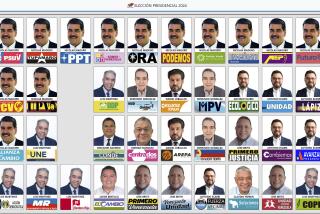RUSSIA : Presidential Prelude : Sunday’s elections for the 450-seat lower house provide a preview of who might emerge as Russia’s next leader
- Share via
MOSCOW — In a country where the president can disband parliament and rule by decree, it would seem to make little difference which parties gain control of the impotent State Duma.
But Sunday’s elections to the 450-seat lower house provide a barometer for gauging who might emerge as Russia’s next leader.
With presidential elections only six months away, the parliamentary vote is a de facto primary and will give top contenders a high-profile podium for that race.
Once Sunday’s votes are tabulated and government portfolios distributed among the most successful parties, Russian voters can expect to see the campaign for the June 16, 1996, presidential election begin.
The field is already crowded, but only five candidates are given serious chances of advancing to a two-man runoff. Here’s how the experts here see the race:
Boris N. Yeltsin or Viktor S. Chernomyrdin
Incumbent Yeltsin, though ailing and often out of touch with the public, is said by his staff to be planning a bid for another five-year term. His approval ratings are abysmal, often below 5%, and his government, headed by Chernomyrdin, is widely held responsible for soaring prices, rampant crime and the intractable conflict in rebel Chechnya.
But the strong-presidency constitution, put in place by Yeltsin, gives him control over the army, security forces and the constitutional court, allowing broad opportunity to influence elections and shackle opponents.
Chernomyrdin is more likely to unite the fractured political center, but he has said he will run for the presidency only if Yeltsin bows out.
Yeltsin has said he will decide about running after the Duma vote. But those close to him say the only contingency is the 64-year-old Yeltsin’s health, ravaged by two mild heart attacks since summer and a reputed penchant for drink.
Grigory A. Yavlinsky
The liberal economist stands virtually alone in pressing for continued economic reforms, despite the pains of transition out of the failed Communist system.
Yavlinsky, 43, ranks among the top two or three politicians in public opinion polls, but in politically fragmented Russia that seldom means more than 10%.
Without like-minded allies in the parliamentary race, his Yabloko movement appears destined to remain a fringe opposition and its leader the presidential choice of only the shrinking intelligentsia.
But Yavlinsky is supported by popular provincial leaders like Boris Y. Nemtsov, the Nizhny Novgorod governor who could help galvanize liberals and centrists to support him for the presidency.
Alexander I. Lebed or Yuri V. Skokov
Lebed, a recently retired army general, has been topping polls as the well-organized Congress of Russian Communities strikes a chord with voters in denouncing crime, insecurity and injustice.
His popularity is likely to propel the conservative-nationalist movement into power as part of a parliamentary coalition. But the inarticulate, un-savvy soldier will likely be outclassed by rivals once voter attention focuses on the search for who will next lead Russia.
Congress leader Skokov is also thought to harbor presidential ambitions and some analysts suspect he may supplant Lebed, if the movement gains a strong foothold in the Duma.
“Who runs will depend on the field of candidates,” says a regional leader of the Congress, Yuri Y. Maslov. “If the competition requires army boots, then Lebed will be our candidate. If intelligence and competence are required, it will be Skokov.”
Gennady A. Zyuganov
Riding a wave of nostalgia for the more predictable life under one-party rule, Communist Party chief Zyuganov should wield considerable influence in the Duma, if projections of a sizable share of seats prove accurate.
The 51-year-old career Communist lacks the crowd-pleasing appeal of populists like Yeltsin, as well as the intellect of Yavlinsky or the charisma of nationalist contenders. But a Communist-controlled Duma could ease the economic burdens of the populace long enough to spur voters to heed Zyuganov’s message that there is a back door out of their discomfort.
If his party dominates the Duma, he would have a handy pulpit for preaching to disgruntled pensioners and state workers that only in the presidency would the Communists have the power to roll back reforms.
Vladimir V. Zhirinovsky
Despite his Liberal Democratic Party’s strong showing in the last parliamentary elections, when it gathered 23%, the nationalist firebrand has lost his footing as the premier protest vote.
Those who chose Zhirinovsky in 1993 to vent anger against economic upheaval now respond more to the Communists; nationalist-patriotic parties, like Lebed’s, have more resonance with voters fed up with crime.
Zhirinovsky’s antics still appeal to the most uneducated of Russian voters in regions that have seen little benefit from four years of chaotic change.
But political forecasts suggest the 49-year-old is a spent force in this country’s politics, lagging behind Lebed, Yavlinsky and Zyuganov.
(BEGIN TEXT OF INFOBOX / INFOGRAPHIC)
ALSO EXPECTED TO RUN
- Mikhail S. Gorbachev, the last leader of the Soviet Union.
- Nikolai I. Ryzhkov, former prime minister under Gorbachev.
- Alexander V. Rutskoi, a former vice president and coup leader.
- Boris G. Fedorov, head of the Forward, Russia! political movement.
- Vladimir F. Shumeiko, first deputy prime minister.
- Boris V. Gromov, a former deputy defense minister, Chechen war opponent.
- Stanislav S. Govorukhin, a prominent member of parliament.
More to Read
Sign up for Essential California
The most important California stories and recommendations in your inbox every morning.
You may occasionally receive promotional content from the Los Angeles Times.














